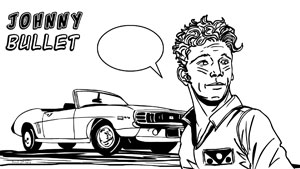|
|
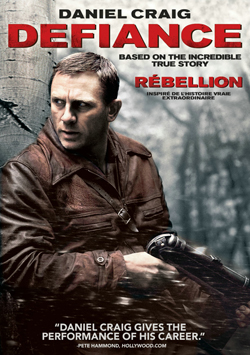 |
The film takes place in the forests of Poland and follows brothers Tuvia Bielski (Craig), the compassionate, contemplative leader, and Zus Bielski (Schreiber), the impulsive fighter, as they try to maintain order and control in an ever-growing community of Jews. In order to survive, they all must learn how to fight and work together. Though it is easier said than done, for when various obstacles confront them, you watch as they fluctuate between somewhat content, decent human beings to restless, selfish animals. Tuvia, being the leader of the group, must try to keep them in check as they are faced with these hindrances. However, seeing as how they were living in volatile times, it only took the slightest hitch to set the group off.
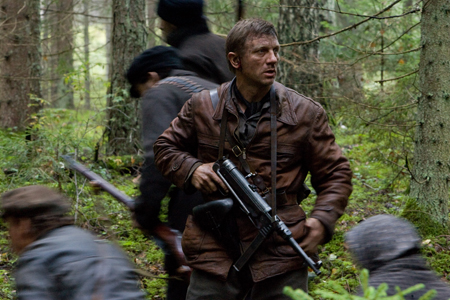 |
The acting was rather diverse, extending from masterful to absolutely atrocious. On the apex of this scale are Daniel Craig and Liev Schreiber. They were both excellent on their own and worked wonderfully together. Craig luminously portrayed an apprehensive, kindheartedly skewed leader. He could be rigid at times, but his compassion was dominant. Schreiber, the tenacious and impetuous Zus, gave off a staggering performance as well. Most of the other characters were average, nothing too special that deserves mentioning, except for one. This character warrants special recognition because she was such a poor actress. Iben Hjejle played Bella, Zus’ love interest. The reason why she was so pitiful, aside from her shoddy acting skills, was the fact that she could not consistently keep the Polish accent. As she was talking, you could hear the accent fade in and out. It is a mystery to me why Edward Zwick would allow such a poor actress onto his set.
On a brighter note, the cinematography was fantastic. It was typical war style filming, yet it was very captivating. The colors were softened and slightly grey-washed especially during scenes of sullen despondency. The Polish influenced musical score was spot-on as well. The soft instrumental tones added an extra level of potency to the film.
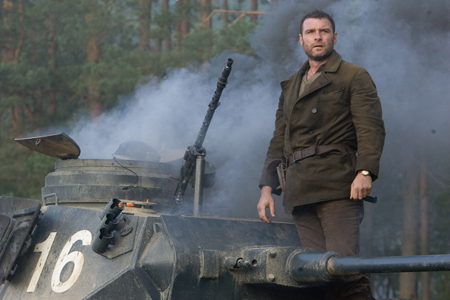 |
Unfortunately, there are a handful of issues I have with this film. First off, seeing as how the focus of the movie was on community, there was very little individual development or involvement. We are not given much history about the characters and how they got to where they were. I am so used to watching characters, learning about who they are and watching them grow, so it is a little offsetting not to see it here. However, this doesn’t bother me too much because, again, the spotlight is on the community and there was quite a bit of development there, so I will just have to take the characters for granted.
What I wish they did explain though, was how the characters were able to speak English. I understand that this was made for a Western audience, but there was quite a bit of Polish sprinkled in there, thus I am sufficiently obfuscated. Personally, even though I dislike subtitles, I think it would’ve made the movie much more powerful if it was done completely in Polish with English subtitles. Even more so, sometimes they spoke as though they were just learning English, mixing up sentence structure and incorrectly using rudimentary words. Other times though, their English became complex and multifarious, as though they were connoisseurs of the language. That just doesn’t make any sense.
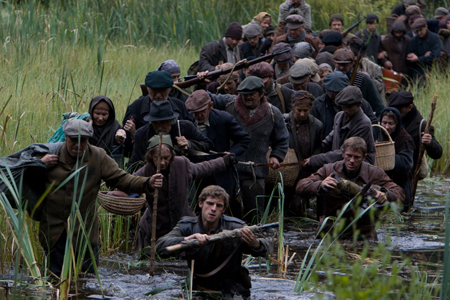 |
With regards to the subtitles, I am a little upset at the ridiculous choice of yellow as the color. I know it is the standard color, but it was far too bright for such a downtrodden, depressing film. They should have used a more subtle color so that it would just blend in with the ambiance of the film.
Moreover, as with most true stories turned movie, it was very “Hollywoodized”. As in, it contained many scenes that were over dramatized and near impossible. For example, there is a gunfight scene where Zus is standing in front of a Nazi jeep at point blank range from a Nazi officer. Even though the officer is spraying bullets in Zus’ direction, not one of them hits him. Utterly ridiculous!
Finally, I was hoping for more philosophical excursions. I was waiting for a religious debate to sprout over the existence or benevolence of God. You’d think that people in this situation would have copious amounts of issues with their beliefs, seeing as how their families were being murdered. I am aware that this is not an issue with the movie per se, I am just a little disappointed that they missed out on the prolific philosophical prospects.
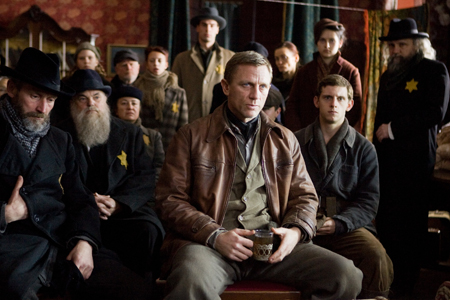 |
As a quick side point, the special features included on the DVD are your regular assortment of commentary, making of and so on. There was only one aspect to the features that I found interesting, and that was, “Children of the Otriad: The Families Speak”. In this segment, the children and grandchildren of the Bielski brothers discuss anecdotes about the brothers, as well as a little bit of their history. In my opinion, I found that it added a deeper level of understanding to the story.
I
do realize that many of the issues brought up above are blatant nit
picking, thus I won’t let them alter my opinion of this movie
drastically. It is a powerful true story of struggle and survival.
And though it is not perfect, it was certainly enjoyable.
If
this is a topic of interest for you, Defiance will
make a fine addition to your film collection. Otherwise, rent it.
7.5/10
© Copyright 2002-2019 by Toon Doctor Inc. - All rights Reserved. All other texts, images, characters and trademarks are copyright their respective owners. Use of material in this document (including reproduction, modification, distribution, electronic transmission or republication) without prior written permission is strictly prohibited.

